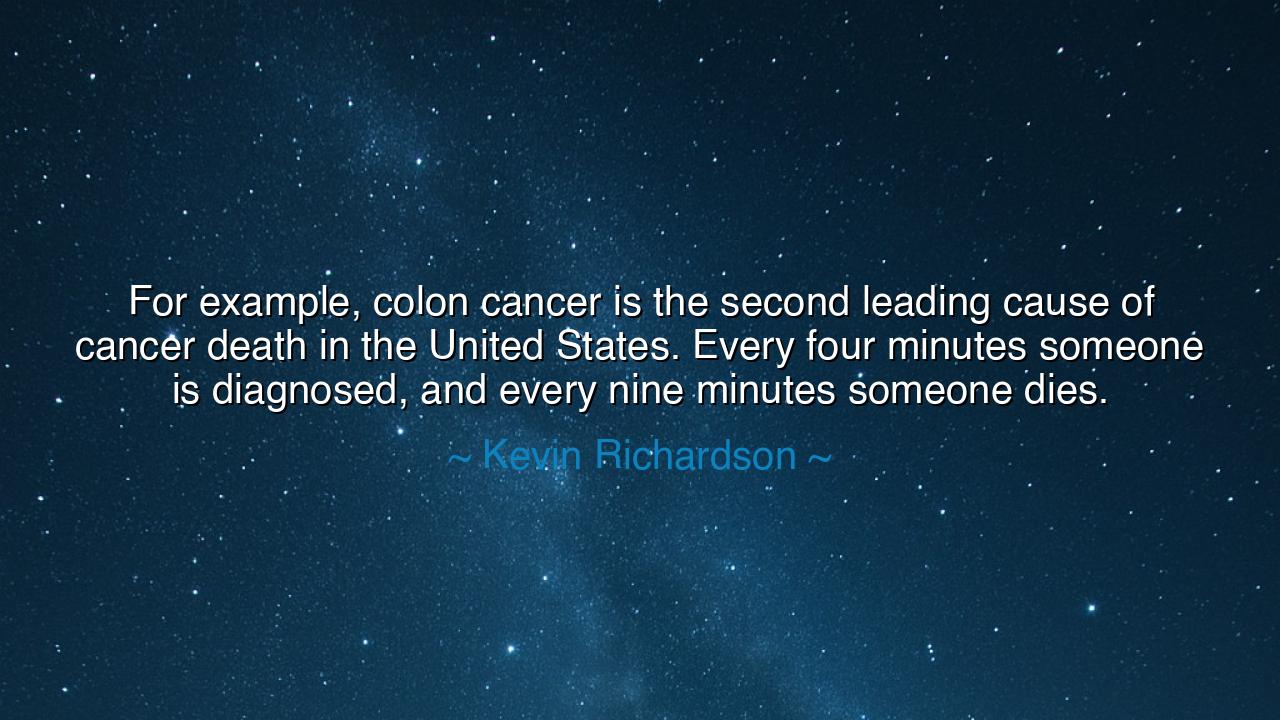
For example, colon cancer is the second leading cause of cancer
For example, colon cancer is the second leading cause of cancer death in the United States. Every four minutes someone is diagnosed, and every nine minutes someone dies.






In the solemn words of Kevin Richardson, “For example, colon cancer is the second leading cause of cancer death in the United States. Every four minutes someone is diagnosed, and every nine minutes someone dies,” we are called not merely to hear statistics, but to confront the fragile truth of our own mortality. These are not the cold numbers of a report—they are the heartbeat of a thousand untold stories, the silent rhythm of lives interrupted. Within this statement lies both a warning and a plea: that we, who are often blind to what we cannot see, must awaken to the quiet dangers that dwell within the body and the world around us. It is a call to awareness, vigilance, and compassion, for every number hides a human face, and every death leaves behind a chorus of grief.
The meaning of Richardson’s words reaches beyond medicine; it is a reflection on the nature of neglect and the cost of inaction. In the ancient world, the healers of Greece and Egypt taught that the body, like the spirit, must be tended before sickness takes root. Hippocrates himself said, “Healing is a matter of time, but it is sometimes also a matter of opportunity.” These words mirror Richardson’s warning—that time is the battlefield upon which life and death contend. To wait, to ignore, to assume health is everlasting, is to offer victory to the unseen enemy. Colon cancer, silent in its early stages, teaches us this truth with cruel clarity: that the absence of pain does not mean the absence of danger.
Consider the story of Chadwick Boseman, the beloved actor who gave life to heroes on the screen yet battled quietly against colon cancer in his final years. His strength inspired millions, but his death revealed a deeper lesson: that even the strong, even the young, are not immune to the frailties of flesh. Boseman’s passing became a beacon, awakening many to seek screenings, knowledge, and vigilance, to act while time still offered mercy. Like Richardson, his life reminds us that awareness is not fear—it is wisdom. To know one’s vulnerability is not weakness, but the beginning of courage.
In this way, Richardson’s quote stands as a modern echo of an ancient truth—that the wise live not in denial of death, but in harmony with the discipline of prevention. The ancients watched the stars to foretell the weather and the tides; we, in our time, must learn to read the signs within our own bodies. For every diagnosis that comes “every four minutes,” there are countless chances to prevent one—to alter fate by seeking care, by listening, by acting early. The gods of old rewarded the vigilant and punished the complacent; so too does life itself, which grants no favor to those who turn away from its warnings.
There is also, hidden in Richardson’s words, a deeper call to empathy. When he speaks of death in minutes, he is not dividing time but weaving a tapestry of shared human experience. Every death, though unseen, diminishes us; every life lost to preventable disease is a reminder that our duty is collective. In the ancient city-states, the health of one was seen as the health of all. The physician and the philosopher stood side by side, teaching that the body and the soul of a people are intertwined. So too must we see this struggle—not as an individual’s misfortune, but as a human challenge demanding unity, compassion, and education.
The lesson, then, is both simple and profound: do not wait. Attend to your body as you would a sacred vessel. Honor it with care, with movement, with the wisdom of early detection. Encourage others to do the same, for love is not merely in words, but in the preservation of life. Speak openly of health, for silence is the ally of disease. To ignore the truth is to let darkness grow unchecked. Awareness, by contrast, is the light that turns fear into strength and knowledge into healing.
So, dear listener, remember the rhythm of Richardson’s warning—every four minutes, every nine minutes—and let it stir your spirit to action. Do not see these numbers as distant, but as reminders of the preciousness of every breath, every heartbeat, every sunrise yet to come. Seek wisdom before crisis, for prevention is the oldest form of courage. And when you act—not only for yourself, but for others—you carry forward the eternal teaching of the wise: that life, though fragile, is sacred, and that to guard it is both a duty and an act of love.






AAdministratorAdministrator
Welcome, honored guests. Please leave a comment, we will respond soon